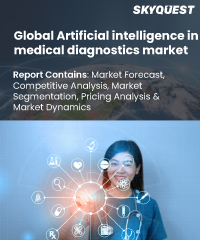
Report ID: SQSG35G2033

Report ID:
SQSG35G2033 |
Region:
Global |
Published Date: February, 2024
Pages:
157
|
Tables:
62 |
Figures:
75
Artificial Intelligence in Medical Diagnostics Market Driver
Large and complex data are produced at various stages of the care delivery process as a result of the growing digitization and adoption of information systems in the healthcare sector. Big data in the field of medical diagnostics includes information generated from clickstream, web and social media interactions, readings from medical devices like sensors, ECGs, and X-rays, as well as medical claims, other billing records, and biometric data. Big data and analytical solutions have grown significantly in complexity and adoption over the last decade, thanks to the increasing adoption of EHRs, digitized laboratory slides, and high-resolution radiology images among healthcare providers. Healthcare is one of the top five big data industries. During the forecast period, the use of bidirectional patient portals which allow patients to upload data and images to their EMRs is expected to boost the volume of big data in medical diagnostics. The need to efficiently manage the ever-increasing volume of large and complex medical diagnostic data is driving the healthcare industry to focus on various Al-based solutions.
Artificial Intelligence in Medical Diagnostics Market Restraint
The rapid development of digital health has made it possible for medical professionals to support patients using different therapeutic modalities. All modern technology gives doctors resources to aid in patient diagnosis and treatment. Doctors, however, have been noted to be reluctant to adopt new technologies. For instance, doctors mistakenly believe Al will take the position of doctors in the near future. Technology cannot entirely replace the presence of a doctor since, according to radiologists and doctors, abilities like empathy and persuasion are human abilities. The fear is that patients may be overly reliant on this technology and forgo critical in-person treatments, which could complicate longer doctor-patient relationships. The accuracy of Al's ability to diagnose patient ailments is questioned by a number of medical professionals. Consequently, it is difficult to persuade providers that Al-based solutions are economical, effective, and secure options that give doctors convenience and improve patient care. However, medical professionals are more and more accepting the potential advantages of Al-based stations and the variety of applications they can be used for. Therefore, it's possible that doctors and radiologists will be more receptive to using Al-based technology in healthcare in the years to come.
Our industry expert will work with you to provide you with customized data in a short amount of time.
REQUEST FREE CUSTOMIZATIONWant to customize this report? This report can be personalized according to your needs. Our analysts and industry experts will work directly with you to understand your requirements and provide you with customized data in a short amount of time. We offer $1000 worth of FREE customization at the time of purchase.

Report ID: SQSG35G2033